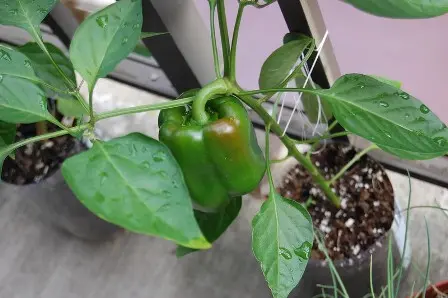As the temperatures drop and winter approaches, many gardeners face the dilemma of what to do with their beloved bell pepper plants. Fortunately, with a little care and attention, it’s possible to overwinter bell pepper plants indoors, ensuring they survive the cold months and continue to produce delicious peppers year-round. In this guide, we’ll walk you through the steps to successfully overwinter your bell pepper plants indoors.
Why Overwinter Bell Pepper Plants Indoors? Bell pepper plants are native to warm climates and are sensitive to cold temperatures. When exposed to frost or chilly weather, they can suffer damage or even die. By bringing your bell pepper plants indoors for the winter, you can protect them from the harsh conditions and extend their lifespan. Additionally, overwintered bell pepper plants often produce earlier and more prolifically in the following growing season, giving you a head start on your pepper harvest.
Step 1: Preparing Your Bell Pepper Plants for Overwintering Before bringing your bell pepper plants indoors, it’s essential to prepare them for the transition. Start by pruning away any dead or diseased foliage and inspecting the plants for pests. Repot the plants if necessary, using fresh, well-draining soil. Trim back the roots slightly to encourage new growth.
Step 2: Choosing the Right Location Indoors Select a suitable location indoors for your bell pepper plants. They will thrive in a spot that receives plenty of sunlight, such as a south-facing window or a bright, sunny room. Ensure the room remains consistently warm, ideally between 65°F and 75°F (18°C to 24°C). Avoid placing the plants near drafty windows or heaters, as sudden temperature fluctuations can stress the plants.
Step 3: Providing Adequate Light Bell pepper plants require ample sunlight to thrive indoors. If natural sunlight is limited, supplement it with artificial grow lights. Position the lights overhead and adjust their height to ensure the plants receive consistent light for 10 to 12 hours per day. Rotate the plants regularly to promote even growth and prevent them from leaning towards the light source.
Step 4: Maintaining Proper Watering and Humidity During the winter months, indoor air tends to be drier, which can lead to moisture stress for bell pepper plants. Monitor the soil moisture closely and water the plants whenever the top inch of soil feels dry to the touch. Use room-temperature water to avoid shocking the roots. Additionally, consider placing a tray of water or a humidifier near the plants to increase humidity levels around them.
Step 5: Fertilizing Sparingly While your bell pepper plants are overwintering indoors, they will not require as much fertilizer as they do during the growing season. Fertilize sparingly, using a balanced, water-soluble fertilizer diluted to half-strength. Apply the fertilizer every four to six weeks to provide the plants with essential nutrients without risking overfeeding.
Step 6: Monitoring for Pests and Diseases Even indoors, bell pepper plants can be susceptible to pests such as aphids, spider mites, and whiteflies, as well as fungal diseases like powdery mildew. Keep a close eye on your plants for any signs of pest infestations or disease symptoms, such as yellowing leaves or unusual spots. If necessary, treat affected plants promptly with organic pest control methods or fungicides.
Conclusion: Overwintering bell pepper plants indoors allows you to protect them from the harsh winter weather and enjoy fresh peppers year-round. By following the steps outlined in this guide, you can successfully keep your bell pepper plants healthy and productive throughout the winter months. With proper care and attention, you’ll be rewarded with a bountiful harvest of flavorful peppers when spring arrives.
MORE POSTS:
How to grow serrano peppers from store-bought serrano peppers?

